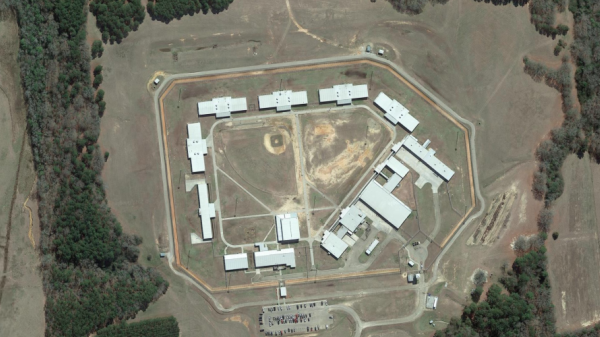|
Getting your Trinity Audio player ready...
|
Angel Harris was told that her son died in prison of a seizure, something he had never suffered from before. Then, no further information from correctional staff for roughly four months.
Reginald Alford, Harris’ son, was serving 35 years at Easterling Correctional Facility for a murder committed in Jefferson County when he was found unresponsive in his cell in the early morning of April. 24. Incarcerated men at the facility had talked with Harris’ brother, who told her that she needed to call the prison and ask about Alford. Harris began repeatedly calling the prison, and each time she was told by correctional staff to call back later.
“I started calling a little before 12:00 up until about 3:00 something, and each time I called, the young lady kept saying ‘you’re gonna have to call back in a couple of hours,'” Harris said in an interview with APR. “Then I call back 15 minutes later, 20 minutes later, and she goes ‘ma’am, you just called a few minutes ago,’ and I said, ‘I understand what you asked me. But this is my son. This is his life.”
Correctional protocol tasks the prison’s Chaplin or the warden with sending an official notice to the deceased’s family when an incarcerated individual dies. Often, families receive word from other incarcerated individuals well before that notice.
While still on the phone and asking questions to correctional staff, Harris received a second incoming call from Easterling. It was from Karen Carter, warden at Easterling.
“She said, ‘Are you Reginald Alford’s mother?’, and I just started screaming,” Harris said.
Harris said that she hung up the phone to gather herself and try to calm down before calling Carter back to find out what happened to her son. The warden said that Alford had died from a seizure. Harris said she couldn’t believe it.
“I said, ‘Ma’am, we don’t have seizures in our family; Reginald has never had a seizure,” Harris said. “I said, ‘Isn’t there anybody else I can talk to? What is going on?’ And she said, ‘that’s all I can tell you at this moment.”
In a phone call with the warden’s office the following morning, correctional staff said that after Harris had signed the paperwork releasing the body to the funeral home, they would not be able to speak with the prison about her son.
“The Secretary said, ‘After you send the paper in to release his body to the funeral hall, we can no longer talk with you,'” Harris said, mentioning that the warden’s secretary said the ADOC would conduct a full autopsy at the state forensic lab in Auburn. “I have to wait 90 days for an autopsy before I know anything. It’s too much. I don’t understand it.”
The ADOC has yet to respond to a question for information on their protocols regarding communication between family members of incarcerated individuals who have died, but the ADOC does not comment on ongoing investigations related to deaths in prisons.
In a statement released to APR, the ADOC said that the case “is under final review” and that once it is finalized, it will be sent to the DA’s office for review.
Harris waited for roughly four months for any news related to her son’s death, calling the ADOC repeatedly over that time. On Thursday, a detective with the ADOC Law Enforcement Services Division notified Harris that her son’s death investigation would go before a grand jury in Barbour County, which will prevent Harris from attending any proceedings regarding the case. The detective also said that it would likely result in a no-foul play overdose and that he doubted she would be notified of when the grand jury would take up the case.
“It wasn’t like I was gonna call back and accused them of anything, I just wanted to call back, to ask if he suffered or what happened, and it was like ‘he is died, and so you just go with your life but don’t call me for nothing,” Harris said. “I called back in April. I called back in May. I called in June and didn’t hear nothing up until now.”
This week, Harris also received an autopsy report showing that her son died from an accidental overdose of synthetic cannabinoids. Narcotics brought into the prison are ofttimes laced with other chemicals or drugs to enhance the effects for the user, resulting in more overdoses due to users being unaware of what compounds are cut with the original drug.
The U.S Justice Department noted in their ongoing lawsuit with the state of Alabama and the ADOC that the correctional system is unable to prevent the flow of narcotics and other illicit materials into the prison, directly leading to more overdoses and death among the incarcerated population.
“The part that gets me as well is that Easterling is a no tobacco, no drug camp,” Harris said. “They aren’t even supposed to have drugs or tobacco, period.”
Harris said that she never asked Alford about the incident that put him in jail because she “didn’t want him to tell me what he thought I wanted to hear.”. Alford was 17 when he was charged with capital murder, his first criminal offense.
“I’m not trying to put my child on a shelf or anything like that,” Harris said. “He had a good heart. He was a good person. He loved people. He loved doing anything for anybody. He was a good kid.”
Alford was 37 years old.























































